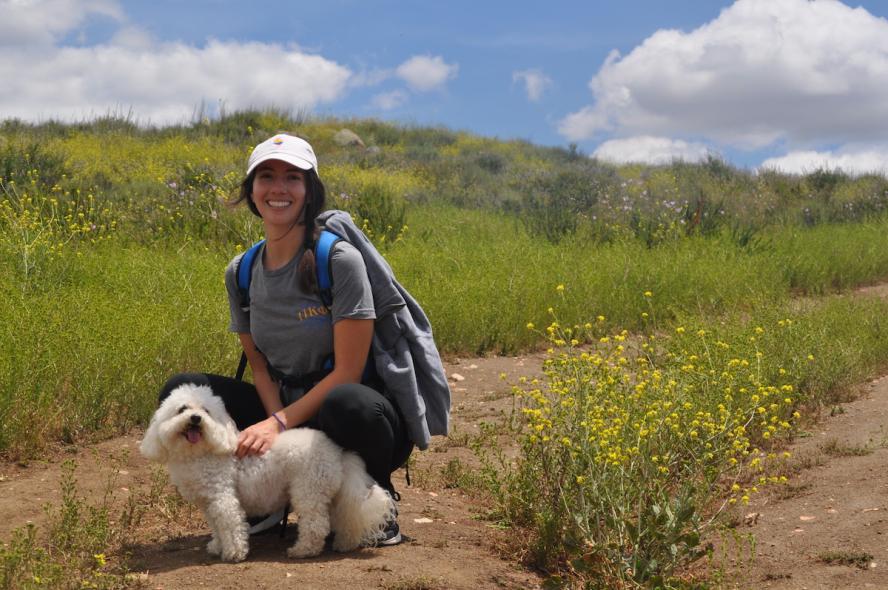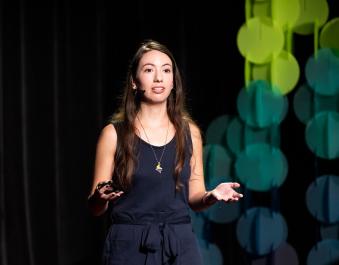-
About
- Leadership & Faculty
- News & Events
-
Academics
- Graduate
- Advanced Clinical Training
- Continuing Education
- Academic Departments
- Academic Offices
- Simulation Experiences
-
Student Life
- Offices
-
Research
-
Hospitals & Clinics
- Emergency Care
- Hospital Services
-
Community Outreach
- Volunteer
Wildlife and Climate Justice Advocate
Tania Roa, VG20 (MAPP), spreads message of coexistence through podcast, presentations, and advocacy work

A 2020 graduate of the M.S. in Animals and Public Policy (MAPP) program, Tania Roa, VG20 (she/her), took the ethics and holistic mindset she adopted at MAPP to embark on a career centering on wildlife and climate justice while spreading a message of coexistence. Cummings School recently caught up with Tania for a Q&A.
Why did you choose to pursue a MAPP degree and how has your MAPP education and experience helped you personally and professionally?
After my undergraduate career, I felt lost. The path I had planned and prepared for didn’t seem like the right fit anymore. Then one day, I came across an article on the importance and urgency of wildlife conservation. I quickly began searching for graduate programs, but the only one that stood out to me was Cummings School’s MAPP. I preferred the policy angle to conservation rather than the typical scientific one. It felt like a program that would lead to a lot of options, and it did.
At MAPP, I learned how to think critically about policy and how to use my passions for societal progress. I also learned how we view animals and why that affects all species, including humans. The ethics and holistic mindset I adopted at MAPP are now the foundation of my career.
Did you develop any Cummings School mentors and, if so, how did they help you?
My advisor, Dr. Allen Rutberg [MAPP program director], was the greatest advisor. He encouraged me to be confident in my dreams and authentic in every assignment and class discussion. The comments he wrote on my papers were insightful and extremely helpful. His guidance motivated me to stay curious and open-minded about life’s possibilities.
The guest speakers Dr. Rutberg invited were mentors, too. One, Alex Blanchette, changed the trajectory of my career and, therefore, my life. He discussed his undercover work at factory farms, describing the horrid conditions to which pigs and migrant workers are subjected. That class sparked my interest in environmental justice, and now I identify as a wildlife and climate justice advocate. And it’s all thanks to MAPP and Dr. Rutberg.
What did you gain from your work with Biodiversity for a Livable Climate?
MAPP provided me with the mindset for a fulfilling career that addresses today’s interconnected crises including biodiversity loss, climate change, and social injustices. Biodiversity for a Livable Climate (Bio4Climate) [an organization that works to reverse global warming through ecosystem restoration] then gave me the solutions, all rooted in nature.
At Bio4Climate, I learned about the millions of people transforming their lawns, backyards, or farms into regenerative ones. Ecosystem restoration looks different depending on the local ecosystem, animals, and culture. However, the core principle is always the same: keep human, animal, and planet health at the center. The many examples I encountered while at Bio4Climate motivated me to become an Earth steward.
How did your TEDxBoston talk come about and how has that helped your work?
I learned about the TEDxBoston conference while I was working at Bio4Climate. One of our supporters shared the link with our team, and my colleague at the time, Maya Dutta, and I applied and were accepted. Maya spoke on the work of Bio4Climate and others planting Miyawaki forests. I spoke about my passion for combining social and climate justice.
When I gave my TEDx talk, various audience members told me they were moved, some to tears. They said the connections I made throughout the talk were crucial but often forgotten in mainstream conversations. I still receive similar reactions from people who watch the online version. These reactions remind me of the importance of explicitly identifying the interconnections between human, animal, and planet well-being. We cannot have one without the other, and that’s why we cannot have environmental justice without social justice. All species and all people, but especially the ones who are often ignored or mistreated, need to be included in whatever plans we implement for a sustainable society.
Why did you co-found the Closing the Gap podcast and how has that aided your development and cause?
My best friend and I, Adriana Medina, often found ourselves discussing enormous issues and wondering what we could do about them: such as racism, homophobia, xenophobia, climate change, and more. We began talking to others about ways to act and realized that many people want to help but don’t know where to start. That’s when we decided that spreading awareness is powerful and increasingly needed. We felt that a podcast was a great way to share stories of people doing amazing things, such as starting nonprofits or offering therapy to often neglected populations, so that listeners can be inspired to support their own communities.
Storytelling is also a tool for healing. For centuries, humans have passed down stories that contain advice, traditions, and a wealth of knowledge. By sharing stories, we hope to connect the dots between various social inequalities, including environmental injustices, and to build a community of people willing to change the status quo.
Could you tell me about your work for Sustainable Harvest International and your belief in its mission?
Sustainable Harvest International (SHI) is a perfect example of environmental and wildlife advocacy. At SHI, we support farmers in Central America who are transforming their farms from slash-and-burn agriculture to regenerative practices. Unfortunately, many tropical forests are wiped away, along with the animals in the area, due to slash-and-burn agriculture. It’s the method that prevails, so many people learn it as a default.
However, when small-scale rural farmers learn of the benefits of soil friendly practices, they quickly realize how it can improve their lives. Regenerative practices benefit planet, animal, and human health. Domestic animals such as chickens and pigs receive both the space and nutrients they need to live healthy lives. At SHI farms, wildlife is abundant thanks to reforestation. We know firsthand how to grow food for families and communities while caring for other species and the Earth, because the health of all species is interrelated.
What’s next for you, personally and/or professionally?
I plan to stay in the environmental nonprofit sector and support environmental justice nonprofits as much as possible by working for them, volunteering, and donating.
For the past three years, I’ve written articles for various magazines, blogs, and organizations. I have also presented at conferences, workshops, and festivals. I plan to continue writing articles and presenting so that I can spread my message of coexistence.
I enjoy traveling, hiking, and snorkeling. I take my camera with me to capture my wildlife encounters, so that others can see the magnificent talents and abilities of other animals. I hope to visit more places and improve my photography so that I can witness more of nature’s beauty and share it with the world.
Advocate and Make a Difference in the World
Cummings School’s M.S. in Animals and Public Policy examines the changing roles of animals in our society. Students learn to effectively evaluate research and policy arguments preparing them for careers in animal protection agencies, conservation initiatives, and environmental advocacy organizations.
Department:
M.S. in Animals and Public Policy
